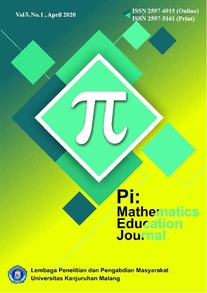EFEKTIVITAS KEMAMPUAN BERPIKIR KRITIS MELALUI MODEL COLLABORATIVE LEARNING DENGAN MEDIA BLOG PADA MATAKULIAH KALKULUS II
Main Article Content
Abstract
Abstrak: Tujuan penelitian ini adalah untuk mengetahui uji efektivitas berpikir kritis mahasiswa melalui penerapan model collaborative learning dengan media blog pada mata kuliah kalkulus II. Penelitian ini menggunakan quasi eksperimental dengan jenis rancangan the nonequivalent pretest-posttest control group. Sedangkan teknik analisis data penelitian yang digunakan adalah Uji t berpasangan (paired t-test), melalui program SPSS 16.0 for Windows dengan Independent Sample T-Test, dengan terlebih dahulu melakukan prasyarat, yaitu uji normalitas dan uji homogenitas, yaitu uji Lilliefors (Kolmogorov-Smirnov) normality test dan uji Levene’s (uji homogenitas). Sampel mahasiswa semester II Unidha dan Unisma berjumlah 118 mahasiswa. Hasil penelitian untuk data postes, berdasarkan hasil uji t melalui program SPSS 16.0 for Windows, dengan menggunakan Independent Sample T-Test (t-test for equality of means) untuk data postes (kemampuan berpikir kritis) di Unisma dan Unidha Malang, diperoleh nilai signifikansi (sig.2-tailed) adalah 0,049 dan 0,045, karena lebih kecil dari 0,05, maka dapat disimpulkan bahwa kemampuan berpikir kritis mata kuliah kalkulus II mahasiswa Unisma dan unidha Malang antara kelompok eksperimen (model collaborative learning) dan kelompok kontrol (model konvensional) berbeda secara signifikan. Berdasarkan nilai rata-rata nilai postes di Unisma pada kelompok eksperimen sebesar 63.67, dan nilai rata-rata kelompok kontrol sebesar 53.43, demikian juga nilai rata-rata nilai rata untuk data postes di Unisma Malang pada kelompok eksperimen sebesar 65.83, dan nilai rata-rata kelompok kontrol sebesar 60.04, dikarenakan nilai rata-rata kelompok ekespeerimen lebih besar dari pada nilai rata kelompok kontrok pada niai postes kedua sampel di Unisma dan Unidha, maka dapat disimpulkan kemampuan berpikir kritis mata kuliah kalkulus II mahasiswa di Unisma dan Unidha antara kelompok eksperimen lebih baik dibandingkan kelompok kontrol.
Kata Kunci: Kemamapuan Berpikir Kritis, Collaborative Learning, Media Blog, Kalkulus II
Abstract: The purpose of this study was to determine the effectiveness test of students' critical thinking through the application of collaborative learning models with media blogs on the second calculus course. This study uses a quasi-experimental design with the nonequivalent pretest-posttest control group design. While the research data analysis technique used is paired t-test, through the SPSS 16.0 for Windows program with Independent Sample T-Test, by first conducting the prerequisites, namely the normality test and homogeneity test, namely the Lilliefors test (Kolmogorov- Smirnov) normality test and Levene's test (homogeneity test). Samples of Unidha and Unisma second semester students totaled 118 students. The results of the study for posttest data, based on the results of the t test through the SPSS 16.0 for Windows program, using the Independent Sample T-Test (t-test for equality of means) for posttest data (critical thinking skills) at Unisma and Unidha Malang, obtained significance values (sig.2-tailed) is 0.049 and 0.045, because it is smaller than 0.05, it can be concluded that the critical thinking ability of calculus II students of Unisma and Unidha Malang students between the experimental group (collaborative learning model) and the control group (conventional model ) significantly different. Based on the average value of posttest at Unisma in the experimental group of 63.67, and the average value of the control group at 53.43, as well as the average value of the posttest data at Unisma Malang in the experimental group at 65.83, and the average value control group of 60.04, because the average value of the experimental group was greater than the average value of the control group in the post-test scores of both samples at Unisma and Unidha, it can be concluded the critical thinking skills of calculus II students at Unisma and Unidha between the experimental groups were better compared to the control group.
Keywords: critical thinking ability, collaborative learning, blog media, calculus II
Downloads
Article Details
Pi: Mathematics Education Journal allows readers to read, download, copy, distribute, print, search, or link to the full texts of its articles and allow readers to use them for any other lawful purpose.

This work is licensed under a Creative Commons Attribution 4.0 International License. The Authors submitting a manuscript do so with the understanding that if accepted for publication, copyright of the article shall be assigned to Pi: Mathematics Education Journal

